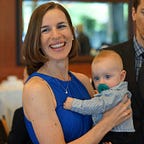There are 2 kinds of people in the world: those who tackle super hard things because they seem like the only things worth doing, and those who don’t find this interesting, or exciting, or worthwhile. I don’t know which is the right life choice. As someone who splits time between technology product management, practicing emergency surgery, and parenting young kids, at least I know which camp I fall into.
I trained for 6 years post-medical school to become the best surgeon I could be. During those many long days and nights, I felt drained to the point of exhaustion and defeat so many times I can’t remember. Yet in the role of surgeon, I participate in people’s most important moments — I literally hold their lives in my hands. The rewards are unparalleled when you can see the forest for the trees.
I switched careers to join a start-up 2 years ago, when the company had fewer than 10 employees. As anyone has done it will tell you, start-ups are super hard. The ups and downs, the ambiguity, wearing many hats with no redundancy. The vulnerability you feel watching a potential customer try out a product that you and your team have invested your whole selves into building. You pour your heart into a future that you *can build* but it’s never guaranteed.
The jump between surgery and start-up life has led me to think about what’s similar and what’s different in these two difficult and fascinating domains. One of the patterns for me is how I approach something super hard. Here’s the high-level primer for someone who (heaven forbid) might want to try things my way:
Think about it for a while to make sure you want to do it. Then commit. I kept a pulse on new companies in healthcare technology for almost a decade before I chose to build Suki. My bar was super high. I was looking for a role where I thought I could shape healthcare delivery at its core. When I found that opportunity — and not before — I was able to jump in with both feet.
Once you’ve decided, take it as a given that you will finish. Stop thinking about it. You can’t give yourself an out when things get hardest mid-climb. That is how you will keep going through insane things. This is also, by the way, how I approach training for long-distance bike rides. I plan the route, commit to finishing what I planned, and then essentially turn off my brain during the ride. That’s not to say you shouldn’t look up now and then to ask whether you’re strategically headed in the right direction. It’s just that the option to give up is not there.
When you feel overwhelmed, focus on doing the next thing. If you turn a problem into small, solvable parts, you can keep chipping away even if the endpoint seems impossibly far away. I remember one of my surgical mentors saying, “A big operation is just a series of small operations.” Early in my surgical training, the Whipple operation — where you remove the head of the pancreas, duodenum, and part of the bile duct — seemed mysterious, complex, a black box… insurmountable. Until I learned to break it down into steps. For expert pancreas surgeons, a Whipple is still hard, but in the way a marathon is hard: once you run 26 miles, you’re at the end. Sometimes you get stuck and you can’t make progress. When that happens, find where you can make progress and work in that direction for a while.
This last one might be specific to me: I rarely talk to others about how hard it is. It’s fun to talk about how to make progress, and I tend to ignore anything that feels like drama, self-pity, or politics. Rarely, I find a kindred spirit who loves doing hard things, and when we connect, I feel peace and inspiration in their camaraderie. I have the privilege of working with some of these folks at Suki — in fact, knowing that our lead investor Bryan Roberts thinks this way helped me decide to join in the first place. I remember him telling our small team that he likes to “look over the edge of impossible, to see what’s on the other side.” So do I.
In Suki, we hope to build the greatest company in healthcare technology. It’s early days still, and it will be a long uphill journey. It takes people who do super hard things to do this. It’s super cool when we find them.
